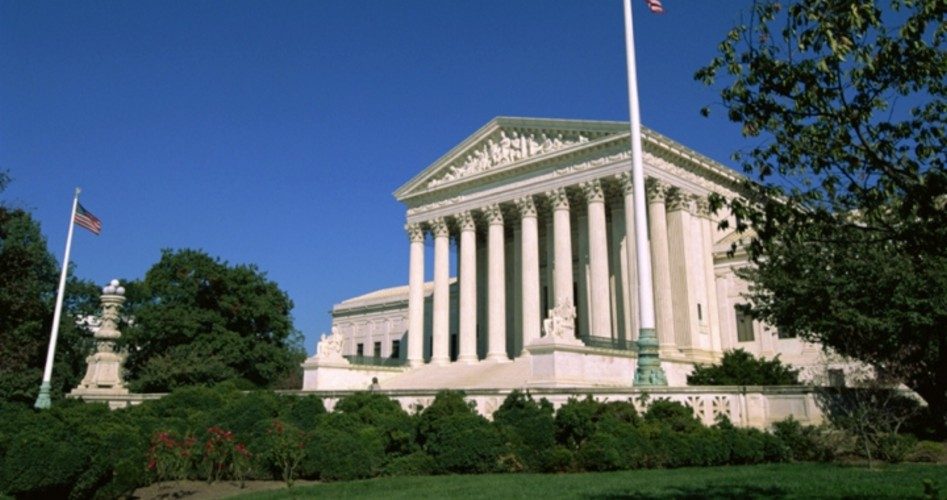
The U.S. Supreme Court on June 25 definitively reaffirmed its 2010 Citizens United v. FEC decision in a 5-4 ruling that struck down a Montana state law banning independent expenditures on behalf of political candidates by corporations. The Supreme Court ruled that the law violated the First Amendment to the U.S. Constitution, which guarantees the freedoms of speech, press, and assembly.
The Montana law the court struck down in the case American Tradition Partnership, Inc. v. Bullock had required that a “corporation may not make … an expenditure in connection with a candidate or a political committee that supports or opposes a candidate or a political party.”
The court majority ruled, “In Citizens United v. Federal Election Commission, this Court struck down a similar federal law, holding that ‘political speech does not lose First Amendment protection simply because its source is a corporation.’”
Justice Stephen Breyer’s dissent argued that “Montana’s experience, like considerable experience elsewhere since the Court’s decision in Citizens United, casts grave doubt on the Court’s supposition that independent expenditures do not corrupt or appear to do so. Were the matter up to me, I would vote to grant the petition for certiorari in order to reconsider Citizens United or, at least, its application in this case.” Joining Breyer in his dissent were the three other liberal justices, Ruth Bader Ginsberg, Elena Kagan, and Sonia Sotamayor.
But corporate speech is not corruption; it is citizen activism. The political Left has campaigned against the Citizens United decision for two years under the slogan that “corporations are not people.” That’s true; corporations and the SuperPacs created as a result of Citizen United are associations of people. And this too was part of the First Amendment, which protected the right of the people to assemble and associate. The right to band together for a political cause and spend money was well-entrenched in the American constitutional system by the 1830s, when Alexis de Tocqueville noted in his Democracy in America that:
In no country in the world has the principle of association been more successfully used or applied to a greater multitude of objects than in America. Besides the permanent associations which are established by law under the names of townships, cities, and counties, a vast number of others are formed and maintained by the agency of private individuals…. An association consists simply in the public assent which a number of individuals give to certain doctrines and in the engagement which they contract to promote in a certain manner the spread of those doctrines. The right of associating in this fashion almost merges with freedom of the press, but societies thus formed possess more authority than the press.
Indeed, how else could American citizens band together politically without forming some sort of corporation or — as de Tocqueville put it — “association” and pooling donations? To overturn the Citizens United decision would be tantamount to allowing the six largest media conglomerates to continue to dominate the political debate. These six media conglomerates are corporations too, but as “media” companies they had been exempt from the provisions of the McCain-Feingold campaign finance laws the Supreme Court struck down with Citizens United.
Interestingly, the court found that the Montana law improperly violated freedom of speech and assembly through the “supremacy” clause of the U.S. Constitution instead of the 14th Amendment. The “supremacy clause” of the U.S. Constitution’s Article VI requires, “This Constitution, and the Laws of the United States which shall be made in Pursuance thereof; and all Treaties made, or which shall be made, under the Authority of the United States, shall be the supreme Law of the Land; and the Judges in every State shall be bound thereby, any Thing in the Constitution or Laws of any State to the Contrary notwithstanding.” But the supremacy clause gives the U.S. Supreme Court no cause of action against a state law banning freedom of speech by an assembly of citizens (corporation), as the First Amendment is directed at federal laws. The First Amendment begins, “Congress shall make no law abridging … the freedom of speech, [etc.]” and says nothing about state laws.
Only the 14th Amendment bans states from taking away rights protected by the U.S. Constitution, exclaiming in the first section of the amendment: “No State shall make or enforce any law which shall abridge the privileges or immunities of citizens of the United States.” Moreover, only the 14th Amendment gives the federal government jurisdiction to prevent state trespasses on those inalienable rights, explaining in the final clause of the amendment: “The Congress shall have power to enforce, by appropriate legislation, the provisions of this article.” Congress has given the Supreme Court appellate jurisdiction over 14th Amendment cases.



